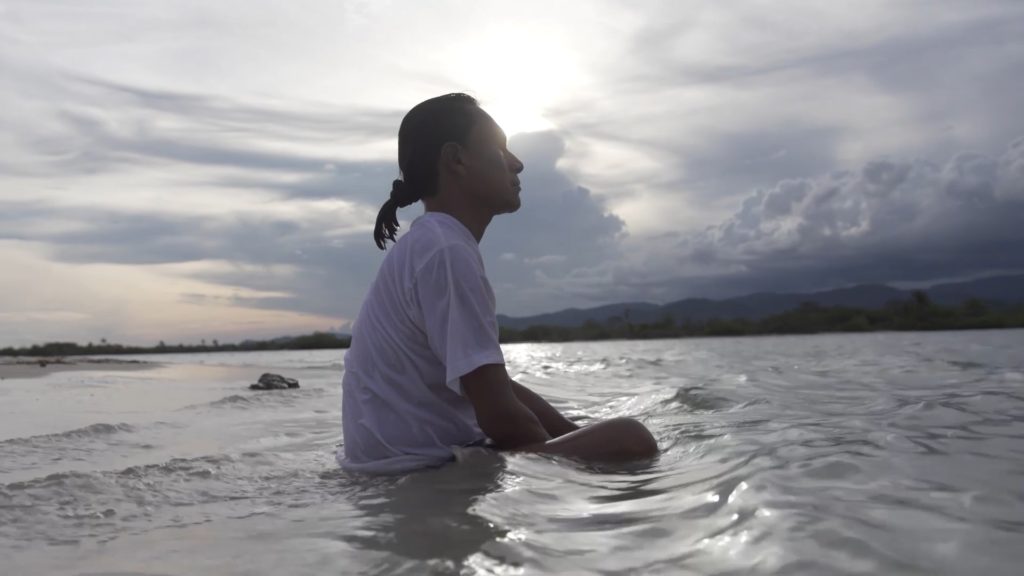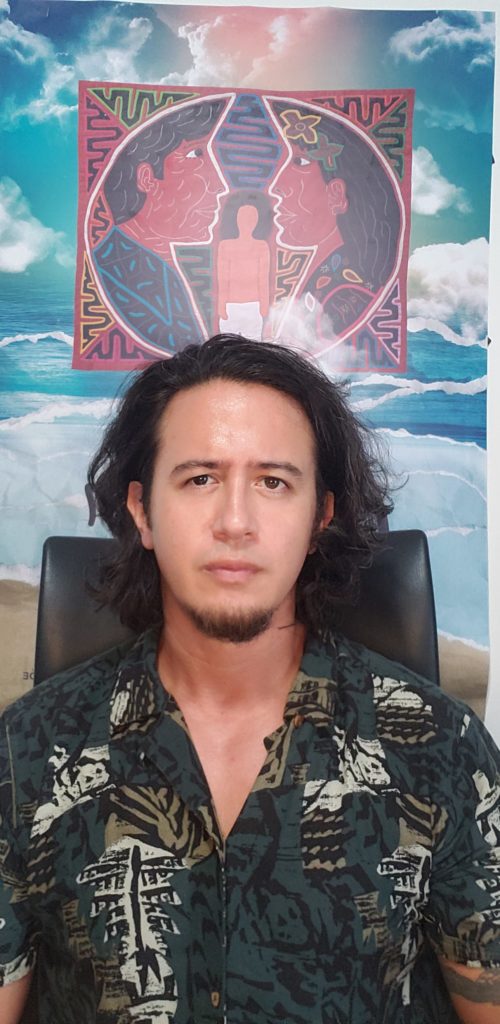导演:费尔南多·穆尼奥斯、拉斐尔·萨拉萨尔
编剧:费尔南多·穆尼奥斯
主演:南丁·索利斯、依那斯·穆尼奥斯、罗萨里奥·阿里亚斯、德博拉·赫尔南德斯
制片人:费尔南多·穆尼奥斯
摄影:拉斐尔·萨拉萨尔
类型:纪录片
时长:72分
完成时间:2021
对白语言:西班牙语、Dule(Guna族语言)
字幕:英语
地区:巴拿马、巴西
制片公司:Enlaces S.A.
Director: Fernando Muñoz, Raphael Salazar
Screenwriter: Fernando Muñoz
Cast: Nandin Solís, Yineth Muñoz, Rosario Arias, Debora Hernandez
Producer: Fernando Muñoz
Cinematographer: Raphael Salazar
Genre: Documentary
Length: 72min
Year: 2021
Dialogue: Spanish, Dule (Guna Language)
Subtitles: English
Region: Panama, Brazil
Production Company: Enlaces S.A.
故事梗概 Synopsis
正如15世纪和17世纪一些殖民编年史中所记载的那样,美洲的一些土著民族认为性别不是男性与女性的二元对立,相反多元性才是主流的观念。在巴拿马,Guna族人将Omeggid人称为“第三性别”,这个称呼不仅仅意味着一种性取向或性偏好。传说很久之前,三位神灵搭乘一个闪闪发亮的飞碟降临到Guna族人的土地上,前来教化族民。神灵之首名叫Ibeorgun,祂教会男人们如何捕鱼;Gigeridyai则告诉女人们如何生育,如何纺织和做家务;三人中的弟弟Wigudun就是Omeggid,祂负责在氏族中组织各种仪式和节日活动。Guna是一个母系社会,女性在其中占有重要地位。她们可以继承土地,此外尽管她们在民众大会中不实际行使领导权,但仍然受到大家的崇敬。因此当Guna族孩子表现出女性的行为举止或对女性的事务感兴趣时,母亲就会将其当作女孩来抚养。南丁、伊那斯、罗萨里奥和德博拉是Wigudun Galu群体的成员,这个群体的所在地被看作是Wigudun的居所,由他们所领导的平权运动将本片中四位自我认同为Omeggid的主角聚集在一起。
本片汇聚和描述了四位主人公以及她们的亲密关系:作为母亲、作为伴侣、作为专家以及作为这一运动的领导者。她们将自己定义为一个独特的集体,并想要争取属于群体的权利。她们想要被看见,她们的斗争过程无比艰辛,她们是跨性别者,她们是Ommegids,她们在自己的社群内外都受到歧视。Gandur的老者还在吟唱着有关Wigudun的歌谣,但关于Wigudun的知识已经无法再传承下去,因为那些老者正逐渐死去,而来自西方的观念,也正逐步渗透到Guna的传统中。
As the colonial chronicles of the 15th and 17th centuries collect, several indigenous peoples of America considered that gender was not binary, male and female, on the contrary, diversity was the rule. In Panama, the Guna People identify Omeggid people as a third gender, which implies much more than a sexual orientation or erotic preference. A long time ago a flying saucer, a brilliant disk, came to the Gunas lands from the sky, from which three great masters descended to civilize the Gunas. The great Masters were Ibeorgun, who took care of the men, taught them to hunt to fish, Gigeridyai, who took care of the women, taught them to have children, to sew their crafts and to carry out household chores. With them also came Wigudun, the younger brother. Wigudun was ommeggid and was dedicated to organizing various rituals and festivities within the community. Guna society is matrilineal, the figure of women is very important in this society, they are the ones who inherit the lands, and although they do not exercise leadership positions in the general congress, they are highly respected and venerated. This is why when a child is approached by women’s tasks and behaviors in that sense, mothers raise them as if they were women. Nandin, Yineth, Rosario and Débora are some of the members of the Wigudun Galu Group (the house of Wigudun, a movement that brings together the omeggids protagonists of this film).
This film brings together 4 protagonists in their intimacy, such as mothers, couples, professionals and leaders of the wigudum movement. They define themselves as a separate group and their claims are particular to their group. They want visibility, their struggle is uphill, they are indigenous, they are trans, they are ommegids. Discriminated inside and outside their community. Old Gandur sings a verse of the Wigudun song. The knowledge about Wigudun is ceasing to be transmitted and the Gandur who know it are dying. Westernization begins to permeate the Guna traditions.
导演介绍 Director Biography
费尔南多·穆尼奥斯是一位阿根廷制片人和导演,自2009年以来穆尼奥斯都在巴拿马进行创作。作为平面设计师,穆尼奥斯在公关形象、插画、书籍设计和广告领域有超过十年的经验。作为导演和制片人,穆尼奥斯拥有一家制作公关宣传视频、MV、商业广告和纪录片的制作公司Enlaces Gestióny Desarrollo S.A.。穆尼奥斯曾执导过《卡吕普索的一夜》,这部纪录片曾在多个电影节上展出,并荣获2016年古巴哈瓦那电影节WIP奖以及2018年巴拿马国际电影节最佳纪录片奖。
拉斐尔·萨拉萨尔是一名在巴拿马创作和生活的巴拿马摄影指导和摄像师。萨拉萨尔参加过多个纪录片、商业广告、MV、企业宣传视频的项目,合作过的品牌包括香奈儿、阿迪达斯和VOGUE(拉美版)。本片是他的导演首作。
Fernando Muñoz is an Argentinian producer and director based in Panama since 2009. As a Graphic Designer, Muñoz worked for more than ten years on institutional image, illustration, editorial design and advertising. As a Director and Audiovisual Producer, Muñoz owns Enlaces Gestión y Desarrollo S.A., a production company that produces institutional videos, music videos, commercial art direction and documentaries. Muñoz directed A Night of Calypso, a documentary that was screened at film festivals and won awards such as Works in Progress at the Havana Film Festival, Cuba 2016 and Best Documentary at Interntional Film Festival of Panama, 2018.
Raphael Salazar is a Panamanian Director of Photography and Still Photgrapher based in Panama. Salazar has worked in several documentaries, commercials, music videos and corporative events and videos for brands such as Chanel, Adidas or Vogue Latam. “Wigudun” is his directorial debut.
导演阐述 Director Statement
这部电影是一部直接电影风格的纪录片,它会展示出日常生活的微妙之处以及最亲密处的冲突。日常故事是简单的,但同时包含着极其复杂的纹理。我们的纪录片关注南丁、伊那斯、罗萨里奥和德博拉的日常,以及Wigudun Galu这个群体,它是由巴拿马Guna族群中的跨性别女性组成的。在土著文化中她们这一角色被称为omeggid。本片将会关注她们的生活和参与的种种活动。我们将会进入她们的家,记录她们的日常生活、她们对生活的看法以及世界观。我们的摄影机镜头会作为一名无声的观察者去记录omeggid夹杂在奋力斗争求得认同和意欲追寻幸福之间左右为难的生活。这些日常场景、会议、事件都被如实记录,并伴随着当时角色的对话,从而免去传统纪录片经常采用的叙述方式和角色访谈。
作为一名纪录片制作者,我们表现人物时不作介入只作观察,这种刻意保持的距离最终却实现了一种亲密感。这也就是我们在大多数情况下选择了广角镜头与大景深的原因:这些技法的使用可以带来很强的临场感,清晰锐利的影像风格为人物增添了一种“照相写实主义”。我认为去讲述这些故事非常重要,特别是在历史呈现断裂的当下,性别理论和社会需求更应当受到重视。基于同样的理由,我们也需要关注Wigudun Galu群体。
Wigudun is a direct cienema documentary, it shows the subtlety of everyday life and its closest conflicts. Everyday stories are simple but contain layers of enormous complexity. Our documentary is focused on the lives of Nandin, Rosario, Debora, Yineth and the Wigudun Galu group, all transgender women of the Guna ethnic group from Panama. Characters called omeggid within that indigenous culture.The documentary is going to get closer to them, their lives and their activities. For this we are going to enter their homes and their daily lives, their visions of life, and their worldview in general.
The camera will follow the omeggids as a silent witness to those lives that are torn between the struggle for recognition and the search for happiness. The daily scenes, the meetings, the events, will be recorded to present them in the documentary as they occur, with the current dialogues of the characters, many times dispensing with the traditional narration and interview.
As a documentary maker, to present the characters, we distance ourselves in the intervention of the production with the observed environment. This distance contrasts with the closeness of the final result. This is why photography is mostly done with wide-angle lenses and great depth of field. The angle allowed us a great approach and the sharpness adds to the hyper-realistic character of the proposal.I think it is necessary to show and tell these types of stories, since this is a historical moment of breakdown where gender theories and social demands in that sense need and must be made visible. The Wigudun Galu group wants to be made visible for these reasons as well.





